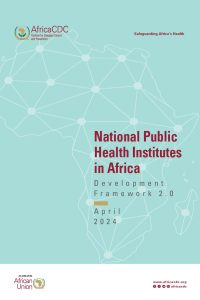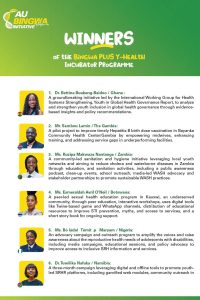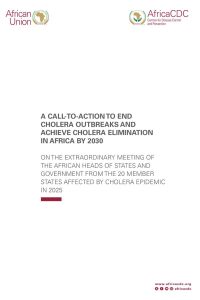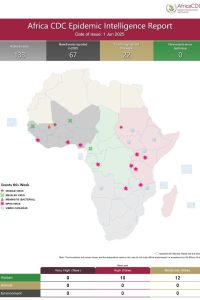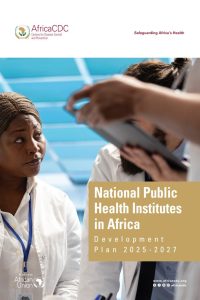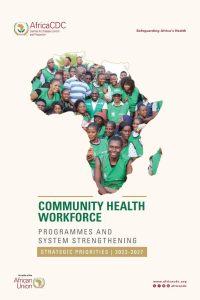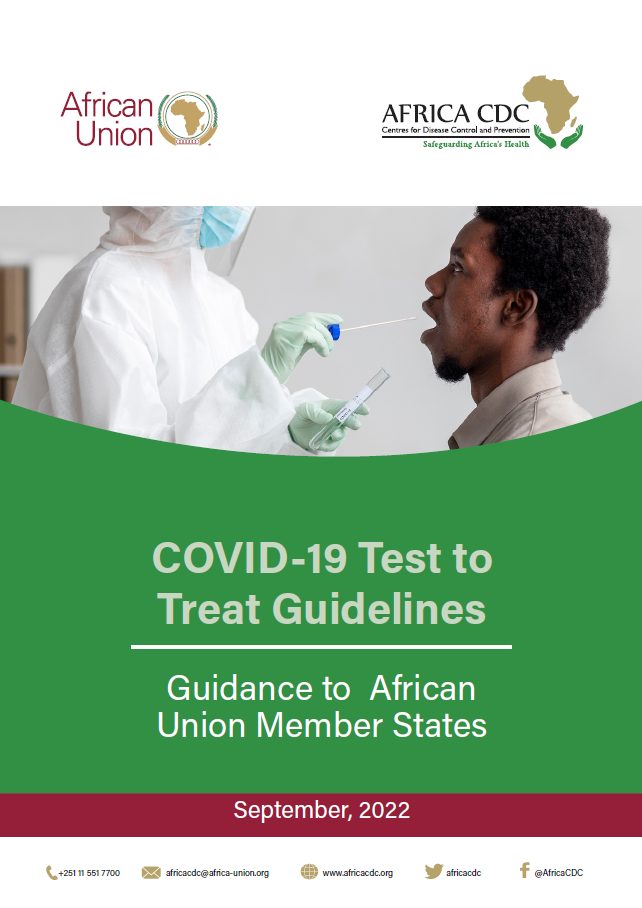
- Version
- Download 6671
- File Size 2.40 MB
- File Count 1
- Create Date 21 September 2022
- Last Updated 21 September 2022
COVID-19 Test to Treat Guidelines for African Union Member States
EXECUTIVE SUMMARY
In response to the outbreak, the Africa Centres for Disease Control and Prevention (Africa CDC) has been supporting African Union Member States in responding to the COVID-19 pandemic through a variety of interventions such as non-pharmaceutical interventions, quarantine, testing, isolation, contact tracing, and clinical management. The Test to Treat guideline aims to increase continental testing efforts and reduce COVID-19 transmission in Africa and put-up response measures to control the impact of the virus, both to limit spread and to reduce substantially the risks of severe health outcomes related to COVID-19 infection. These countermeasures include highly effective vaccines and boosters, rapid testing options for monitoring exposure, and effective therapeutic options for both pre-exposure prevention and treatment of mild-to-moderate disease, oxygen therapy for moderate-severe disease, all of which can potentially be updated efficiently as new variants emerge that may affect the effectiveness of the available tools. The guideline is a living document and will continue being updated as the COVID-19 pandemic evolves.
As of early 2022, there are increasingly a broad array of therapeutics available to prevent the serious consequences of SARS-CoV-2 infections. Test to Treat is a concept of facilitating expedited access to treatment by allowing patients to easily receive both COVID-19 testing and rapid access to available treatments. This guideline recommends a one-stop-care for COVID-19 testing and treatment such as home-based care by community health workers, community test centres and local community pharmacies, working closely with community health centres and hospital facilities including outpatient and inpatient departments at health facilities. This Test to Treat guideline is a key element of enabling COVID-19 containment on the African continent, both to save lives and livelihoods, and preventing further disruptions from new variants or surges. Africa CDC is cognizant of the rapidly evolving epidemiological nature of COVID-19 pandemic, and encourages establishment of Test to Treat sites, which will provide “one-stop” testing, medical evaluation, and, if appropriate, provide treatment for COVID-19. The Africa CDC looks forward to successful adoption and implementation of this guidance to augment Test to Treat initiatives to enhance access to testing and treatment on the African continent.
1.0 BACKGROUND
1.1 Natural history of COVID-19
Severe acute respiratory syndrome coronavirus 2 (SARS-CoV-2) is a novel severe acute respiratory syndrome coronavirus. It was first isolated from three people with pneumonia connected to the cluster of acute respiratory illness cases in Wuhan, China, on 31 December 2019. On March 11, 2020, the coronavirus disease 2019 (COVID-19) was declared a pandemic by the World Health Organization (WHO). All structural features of the novel SARS-CoV-2 virus particle occur in related coronaviruses in nature. SARS-CoV-2 is postulated to have originated in a large animal and seafood market. The virus is spread by coughing, sneezing, singing, talking and so on. During activities that produce droplets, the virus is released into the air. If other people inhale those droplets, or get them into their mouth, nose, or eyes they may become infected with the virus. The COVID-19 outbreak has caused severe disruptions to healthcare systems globally and the overall well-being of people. The COVID-19 pandemic is still rapidly and frequently evolving, as is the case with COVID-19 therapeutics. The first line of protection against severe COVID-19 outcomes is vaccination against the disease. Several COVID-19 outpatient therapeutic options are currently available. Treatments are available for eligible patients based on exposure status, symptoms and risk factors for severe disease progression. Ultimately, COVID-19 treatments play an important role in preventing severe illness and helping people recover from COVID-19, with the goal of saving lives, reducing hospitalizations, and relieving pressure on stressed hospital systems.
The Africa Centres for Disease Control and Prevention (Africa CDC) has been supporting African Union Member States to respond to the COVID-19 pandemic since 2020, through a series of interventions, including non-pharmaceutical interventions, quarantine, testing, isolation, contact tracing, and clinical management. Clinical care of patients with COVID-19 is changing with the unfolding of events and research into the SARS-CoV2 virus. Oral antiviral drugs and monoclonal antibodies are late arrivals to the continent; many people are not sure if they qualify to receive these treatments or when to begin treatment, and others do not have a healthcare provider to ask.
Test to Treat aims to remove those barriers. To help increase continental testing efforts and reduce COVID-19 transmission in Africa, Africa CDC launched the Partnership to Accelerate COVID-19 Testing (PACT): Test, Trace to Treat. PACT mobilized experts, community workers, supplies and other resources to TEST, TRACE and TREAT COVID-19 cases in a timely manner to minimize the impact of the pandemic on the African continent. Provision of timely, effective and safe supportive therapies is the cornerstone of treatment for patients with severe COVID-19.
Attached Files
| File | Action |
|---|---|
| COVID-19 Test to Treat Guidelines for African Union Member States - September 2022 | Download |

